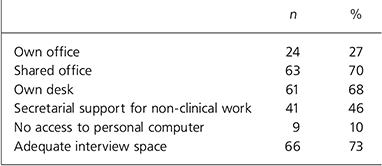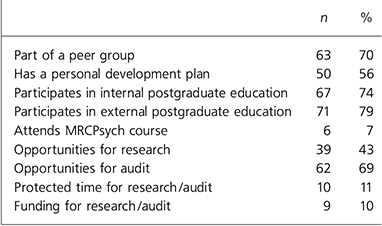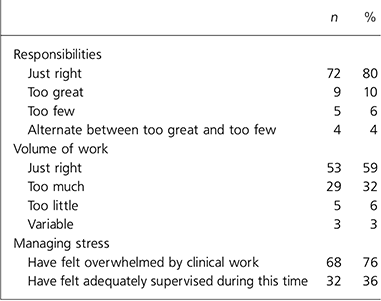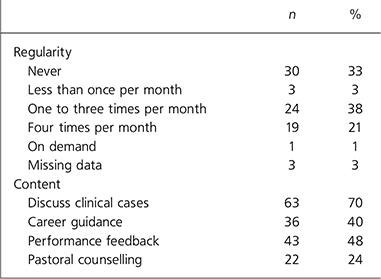Non-consultant career grade (NCCG) doctors comprise staff grade doctors and associate specialists and ‘trust grade’ doctors who are non-standard grade medical practitioners. These posts were created in 1987 by the Department of Health, but the enormous increase in the numbers of doctors in such posts since 1987 is now well known (Reference CooperCooper, 2002).
Despite some important initiatives there has been concern as to how the professional needs of this group are being met. Many of these doctors continue to feel marginalised, have little scope for career progression and have limited access to educational activities which are important for professional development. There are frequent reports of these doctors being unable to secure clinical cover or funding for study leave despite acting as the ’ backbone’ of the National Health Service (NHS). The job content and quality of these posts are also extremely variable and some trusts and College members do not appear to realise that new posts should be reviewed after 12 months (Royal College of Psychiatrists 2003).
Non-consultant career grade psychiatrists have recently been described as the ’forgotten tribe’ (Reference CooperCooper, 2002). There is a view that attracting and retaining doctors in these posts is not given enough emphasis by employers (Royal College of Physicians, 2000) and that the current situation does not meet the needs of clinical governance and revalidation (Royal College of Psychiatrists, 2003). The Audit Commission examined the current state of medical staffing in the NHS in July 2001 and found improvements compared with earlier reports in the mid-1990s, but still highlighted 'significant problems’. Specifically, it underlined how many doctors are being asked to act as specialist registrars without appropriate qualifications and the marked differences between hospitals as to how many doctors are being employed (Reference GouldGould, 2002).
However, some NCCG doctors feel appropriately supported, that their clinical load is adequate for their level of experience and that their job fits in well with personal commitments (Reference DosaniDosani, 2002). More recently, there were discussions about a new contract for staff and associate specialists that would address low pay, ensure career progression by creating a 'single spine’, create clear mechanisms for re-entry to training and access to specialist registrar posts and a more robust job planning protocol. There was also a view that NCCG doctors are beginning to be more fully represented as a group by the British Medical Association (Reference Khan and TruelandKhan & Trueland, 2003). Other more optimistic initiatives include the Department of Health's document Choice and Opportunity which seeks to modernise working conditions for NCCG doctors and puts forward key principles for reform (Department of Health, 2003).
We sought to explore these issues by surveying key features of jobs undertaken by NCCG doctors in the south-west region. By investigating job content, responsibilities, volume of work, supervision, education and continuing professional development we built up a comprehensive picture of the working lives of NCCG doctors in the south-west of England.
Method
We sought to identify all NCCG doctors in the south-west of England by contacting the human resources departments of all known trusts. Many did not have an up-to-date list of this group of doctors so we also had to rely on local knowledge and word of mouth. We sent out 140 questionnaires to all those we identified. The questionnaire had seven sections; each except the first included a yes/no category, a box for additional comments and covered the following areas.
Section one covered demographic details including gender, age, number of years in psychiatry, length of time in current post, on-call commitments and whether or not the MRCPsych examination had been passed.
Section two investigated administrative support, such as whether the doctor has their own office, secretary, personal computer and access to the internet.
Section three explored educational opportunities. This included questions about entitlement to study leave, financial and motivational support for this and the availability of adequate cross-cover arrangements. Personal development plans were enquired about, as were the opportunities to sit the MRCPsych examination and to participate in case conferences and/or journal clubs.
Section four took research and audit as its theme and asked whether there were sufficient opportunity and resources for these activities.
Section five addressed clinical work. This included the volume of work, availability of interview space and whether responsibilities were believed to be appropriate to grade and experience. The section also looked at whether the individual had felt significantly overwhelmed by their workload at any time and the degree of support they had received from the rest of the team during this period.
Section six covered the issue of supervision.
Section seven explored the issue of personal safety.
We collected quantitative data which were presented using descriptive statistics collated using SPSS, version 10 for Windows. Comments in the boxes were also used to elaborate the findings.
Results
Of the 140 questionnaires sent, 90 (65%) were completed and returned by June 2003. Of these 90 respondents, 63 (70%) were female, 27 (30%) male and the average age was 45 years. The average duration of working in psychiatry was 12 years 9 months and the average duration in the current post 5 years 6 months. Of the 90 respondents, 70 (77%) were staff grades, 8 (9%) associate specialists and 30 (14%) clinical assistants. Twenty respondents (22%) had passed the MRCPsych examination.
Administrative support
Most NCCG doctors shared an office (63, 70%), with only 24 (27%) having their own office (Table 1). Only 61 (68%) had their own desk, although a significant proportion of these would be part-time. Only 41 (46%) had administrative support for non-clinical work; 15 (16%) had their own personal computer and 67 (74%) shared one. There were 9 respondents (10%) with no access to a computer. Only 66 (73%) claimed to have access to interview space.
Table 1. Administrative support

| n | % | |
|---|---|---|
| Own office | 24 | 27 |
| Shared office | 63 | 70 |
| Own desk | 61 | 68 |
| Secretarial support for non-clinical work | 41 | 46 |
| No access to personal computer | 9 | 10 |
| Adequate interview space | 66 | 73 |
Educational opportunities
Only 63 (70%) belonged to a formal peer group and 50 (56%) described a professional development plan (Table 2); 37 (41%) had regular appraisals. Data on study leave were not conclusive as only 57 respondents (63%) knew what their entitlement was. Eighty-two (91%) did get study leave, being entitled to a mean of 30 days in 3 years; 71 (79%) were supported in this with available funding. Three-quarters of respondents claimed that they were encouraged to participate in internal and external professional development meetings, 20 (22%) had the MRCPsych, 6 (7%) attended MRCPsych courses and 45 (50%) claimed that they were not eligible to sit the examination. Although 39 (43%) and 62 (69%) said that they were involved in research and audit respectively, only 10 (11%) claimed to have protected time for this and 9 (10%) had funding available for such work.
Table 2. Educational opportunities

| n | % | |
|---|---|---|
| Part of a peer group | 63 | 70 |
| Has a personal development plan | 50 | 56 |
| Participates in internal postgraduate education | 67 | 74 |
| Participates in external postgraduate education | 71 | 79 |
| Attends MRCPsych course | 6 | 7 |
| Opportunities for research | 39 | 43 |
| Opportunities for audit | 62 | 69 |
| Protected time for research/audit | 10 | 11 |
| Funding for research/audit | 9 | 10 |
Job content
Only 63 respondents (70%) had a job description; 31 (34%) were aware that this had to be approved by the regional advisor and 24 (27%) were unaware whether or not their job content could be changed. Twenty-seven respondents (30%) worked a daytime on call, with 19 (21%) on duty at least 1 in 5 sessions; 14 (16%) worked a night-time on call, with 3 (3%) working at least 1 in 5 sessions. Most said they were paid for this, although a small minority (3, 3%) claimed not to be, nor to have time off in lieu.
We investigated whether individuals believed that they were given responsibilities appropriate for their grade. Seventy-two respondents (80%) were comfortable with the degree of responsibility and of the 18 (20%) who were not, 9 (10%) found themselves taking on too much responsibility, 5 (6%) too little, and 14 (4%) saying their work load alternated between being too much and too little (Table 3). Feedback about the volume of work showed that 53 respondents (59%) found this to be just right, with 29 (32%) claiming too much work and 5 (6%) too little. Sixty-eight respondents (76%) often felt overwhelmed by their workload and only 32 (36%) reported adequate supervision during this time. With regard to the availability of consultant advice on clinical matters, 14 (16%) claim only to have intermittent contact with a consultant, whereas 8 (9%) report having no access to this level of clinical support.
Table 3. Job content

| n | % | |
|---|---|---|
| Responsibilities | ||
| Just right | 72 | 80 |
| Too great | 9 | 10 |
| Too few | 5 | 6 |
| Alternate between too great and too few | 4 | 4 |
| Volume of work | ||
| Just right | 53 | 59 |
| Too much | 29 | 32 |
| Too little | 5 | 6 |
| Variable | 3 | 3 |
| Managing stress | ||
| Have felt overwhelmed by clinical work | 68 | 76 |
| Have felt adequately supervised during this time | 32 | 36 |
Supervision
One-third of NCCG doctors had never had supervision and only half had protected time allocated for this. Of those who did receive supervision, the regularity varied from between 1 and 4 sessions every month, with 3 (3%) receiving supervision less than monthly or on demand (Table 4). The duration of supervision was extremely variable, but was often less than 30 min. When asked about the content of supervision sessions, 63 (70%) said they discussed clinical cases, 36 (40%) sought career guidance, 22 (24%) sought ’ pastoral counselling’ and 43 (48%) discussed their job performance. A separate question relating to whether independent career guidance was available revealed that 15 (17%) were able to obtain this but 32 (36%) felt they needed it and were unable to access it.
Table 4. Supervision

| n | % | |
|---|---|---|
| Regularity | ||
| Never | 30 | 33 |
| Less than once per month | 3 | 3 |
| One to three times per month | 24 | 38 |
| Four times per month | 19 | 21 |
| On demand | 1 | 1 |
| Missing data | 3 | 3 |
| Content | ||
| Discuss clinical cases | 63 | 70 |
| Career guidance | 36 | 40 |
| Performance feedback | 43 | 48 |
| Pastoral counselling | 22 | 24 |
Discussion
Respondents did seem content with their work as NCCG psychiatrists; this seems to be an increasingly popular way of working as it suits many people's lifestyles and aspirations and there was on the whole job satisfaction. Many felt well supported by their teams and were satisfied with their work as illustrated by this comment:
‘Regarding my clinical work, the consultant is supportive and allows me freedom of action and judgement but is available for advice if needed. Their enthusiasm is infectious which is one of the reasons that I enjoy my job’.
However, the increased popularity of these jobs, the huge expansion of posts and the trend for the working practices of doctors to be more accountable and transparent necessitates consideration of the areas of concern in relation to these posts. One of the initial findings of this study was the difficulty in locating individuals in these posts. None of the medical personnel departments contacted had a comprehensive database of NCCG posts and the lists we did manage to obtain consisted mostly of people who had retired, left the post up to 20 years previously or had never worked there! Hence we had to rely on our own knowledge of who was working in the area, which was far from satisfactory.
The availability of administrative support and space within which to work was a significant area of concern. Although this is often a point of debate and conflict within teams, it became apparent that for NCCG doctors this kind of support was particularly important because they are often in post for many years and have a more permanent workbase within a department, so the lack of adequate work space and support would therefore be particularly difficult. Moreover, there are not, as is the case for trainees, any guidelines for minimum standards. There were comments such as:
‘not having office/desk space is the most stressful part of my job and the main reason to leave asap.’
‘I have a small area of working surface in the secretary's office which is a converted toilet. I have a corner of a desk which doubles up as a general dumping ground.’
Many of our respondents were not eligible to sit the MRCPsych examination. This raised questions as to why this was the case and the potentially more serious concern that the NCCG posts themselves might contribute to doctors becoming disadvantaged in this respect. This area was not explored fully in our study, but we did discover that of those who were eligible few seemed to have the opportunity to sit the examination. This highlighted the potential problem of people becoming stuck in non-training positions without the prospect of career progression. We received such comments as:
‘I would like to sit my MRCPsych but find service commitment precludes this. Re clinical work, there are clear steps that could be taken that would enable me to use my time more appropriately and further my career.’
Another theme emerging from our research was that clinical commitments were often such that time for studying was curtailed. Many NCCG doctors find themselves having to be the one to cover for trainees when they have their protected study time. For example:
‘re education; poor opportunities; I am expected to work extra unpaid hours if I take time off for education.’
‘too little internal activities available to meet minimum requirement for CPD. Very little access or info about external courses, meetings, etc.’
We were also concerned about the low level of attendance at professional development plan meetings. Similarly, only 37 respondents (41%) claimed to have been appraised at any point in their present posts. A number felt that because they work part-time, their training needs get neglected because of overemphasis on clinical work. Involvement in research and audit was also an area where doctors felt they were not getting sufficient experience because of clinical demands.
There were some major concerns regarding supervision. In general, respondents found it to be a neglected area, sessions being infrequent, not prioritised and of short duration. One commented:
‘I have had no supervision since the trainee joined the team’.
Others indicated that much depended on the relationship between the NCCG doctor and their senior colleagues. In general, most found supervision useful not just for discussing clinical cases but for reflecting on broader issues, for example dynamic issues within the team. Most did not wish to use supervision sessions to discuss personal matters, but felt that their career needs could be attended to in more depth:
‘my supervision is mostly about clinical cases and not about my career.’
‘supervision comes unofficially on ward rounds’.
There appeared to be confusion as to the exact role of the NCCG psychiatrist. It seemed to fall anywhere between a substitute senior house officer and often adopting clinical responsibilities akin to those of a consultant. These roles would of course be expected to differ between jobs and individuals, but the lack of definition seemed to cause confusion and difficulties. As one doctor put it:
‘I am expected to perform menial tasks, e.g. taking blood, yet also expected to cover when the consultant is away, without adequate supervision.’
Associated with this was the issue of workload, which many felt was adequate. However, a significant number felt overwhelmed and unsupported.
‘regarding clinical work I had no consultant for 3 years and there was little attempt made to recruit. Workload is excessive, there are no trainees owing to the lack of consultant. I get no supervision.’
Our results suggested a pessimism of a significant proportion of NCCG doctors despite the popularity of the work and the clear contentment of others. The picture is not universally bleak and there appear to be plenty of areas where practical and managerial changes could improve the situation significantly. In particular, this study highlighted the enormous perceived value of supervision. Those who received it praised it unequivocally and no one said they did not want it.
There seems to be no reason why guidelines for supervision should not be part of a work contract and why there should not be some external monitoring. More work could be done to support and guide the supervisors. In situations where a NCCG doctor's consultant is not able to provide supervision, other provision could be made. In some cases, external help may be preferable. However, in all cases supervision should be protected, explicit and formal rather than haphazard.
Similarly, there appears to be a case for being clearer about the role of the NCCG psychiatrist. This could be formalised by a comprehensive job plan. It is not part of our remit to consider the detail of such documents, but a job plan agreed on a mutual basis by the NCCG psychiatrist, the trust and the responsible consultant, and which would be subject to regular review, could be extremely valuable.
Our study also outlined areas which would benefit from further evaluation. The replication of such a study in other areas of the country would provide comparative frameworks and perspectives. Studies which looked at particular demographic details such as ethnicity, gender and the proportion of part-time employees would uncover controversial issues of potential discrimination. We were very concerned about the small number of respondents eligible to take the MRCPsych examination, but did not have enough data to comment on why this was so; other studies addressing this issue may prove invaluable.
Declaration of interest
N.C. was formerly staff grade psychiatrist at Fromeside Clinic, Blackberry Hill Hospital, Bristol and L.G. was staff grade psychiatrist at Wickham House, Blackberry Hill Hospital, Bristol.









eLetters
No eLetters have been published for this article.